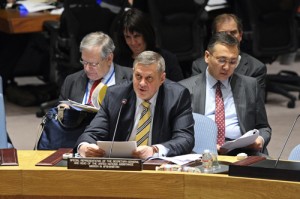UNITED NATIONS — The clock is ticking and the calendar counting down for Afghanistan as the embattled South Asian country heads for presidential elections in April and the pullout of foreign security forces by the end of the year.
A credible electoral process would go a long way in paving a peaceful transition for the war torn country which must soon bear the brunt of its security challenges without the help of American and NATO troops after 2014.

Addressing a Security Council meeting , Jan Kubis, the head of the UN Assistance Mission in Afghanistan (UNAMA) urged the country’s voters “Do not let spoilers and terrorists deprive you of your choice, of your future.” Kubis advised that given the delicate transition, “a credible electoral process could provide much needed stability for peace and reconciliation.”
During the Council debate delegates expressed concerns over Afghanistan’s future, especially following the planned pullout of American and other countries in the International Security Assistance Force (ISAF).
American delegate Rosemary Di Carlo stated the United States “was under no illusions” that the transition would be smooth.
Other delegates were more specific on the enduring threats. India’s Amb. Asoke Kumar Mukerji stressed that the “main threat to security and stability was terrorism emanating from beyond Afghanistan’s borders.” He alluded that “it was unfortunate that the terrorists sanctuaries and safe havens as well as financial and tactical support structure were still active.”
This comment reflected a veiled reference to neighboring Pakistan and the “double game” the Islamabad authorities have played supporting different Taliban militant factions.
Amb. Mukerji conceded, “India does not have the luxury of an ‘exit strategy’ in Afghanistan which shares a civilization linkage with India.”
Russia’s Amb. Vitaly Churkin equally pressed the terror theme adding that a recent report by the Secretary General “failed to mention many challenges including the presence of Al Qaida.” Islamist forces were active not only in remote areas but along the Turkmenistan border. He asked “to what extent could the artificial timetable for ISAF’s withdrawal be justified?
Despite the humanitarian, human rights, and educational building blocks of the UN Mission, the real question centers on whether the Kabul government can stand on its own feet following the pullout of international security forces, mostly American, by year’s end? Though the current Afghan President Hamid Karzai’s government has said a resounding No to the continued presence of foreign security forces, all contenders in the upcoming election apparently favor a small rapid deployment security force.
Given the stinging lessons of the Iraq pullout without leaving a small American contingent, the Obama Administration has tried, without success, to get a deal for a crucial security presence in Afghanistan.
Italy’s delegate Sebastiano Cardi stated that it would be of “fundamental importance that Afghanistan and the United States sign the Bilateral Security Agreement “ since delay would have a clear impact on planning NATO’s future in the country.
The United States, United Kingdom, Germany, and Italy remain the largest troop contributors among the 49 countries in the ISAF mission.
Canada’s Amb. Michael Grant added, “we call upon the government of Afghanistan to sign without delay the requisite Afghanistan/ U.S. bilateral Security Agreement.” While Canada’s military role in the long conflict had ended, Ottawa has pledged $227 million in development assistance between 2014 and 2017, and equally has beefed-up aid for Afghan military pay at $330 million over the next three years.
Economic support remains vital for Afghanistan’s fragile future. Japan has been a major donor from the start.
Since 2002, Japan had contributed more than $5 billion for development assistance according to Amb. Motohide Yoshikawa; in fact Tokyo has funded approximately a third of the total salaries for the Afghan National Police and has built or renovated more than 820 schools around the country. The Japanese have placed particular emphasis on education for girls.
Importantly given Afghanistan’s recent history and continuing security challenges, stability remains at the core for the future. Slovak Amb. Frantisek Ruzicka stated, “Overall security remains the most important precondition for continued development in Afghanistan — political, economic or cultural.”
Security while largely now the responsibility of Afghans themselves, must still realistically get continuing political and economic support from the international community. Significantly an Afghan/U.S. security pact to preserve the gains of the past decade and to prevent Afghanistan’s precipitous fall into the political abyss would provide such support and is thus crucial.
John J. Metzler is a U.N. correspondent covering diplomatic and defense issues. He writes weekly for WorldTribune.com. He is the author of Transatlantic Divide ; USA/Euroland Rift (University Press, 2010).


You must be logged in to post a comment Login